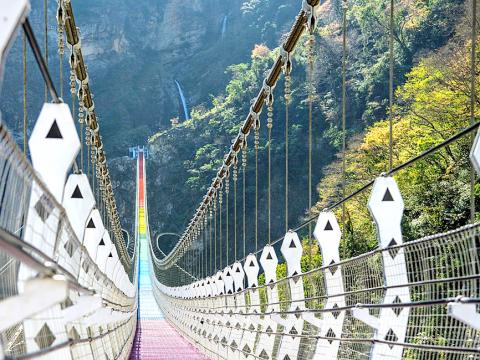A suspended bridge near the Double Dragon Waterfalls (雙龍瀑布) in Nantou County is to open to tourists next month, the county government said.
The 342m-long bridge, which hangs 110m above the ground, is currently the tallest and longest suspended bridge open for tourism in Taiwan, the county said, adding that it cost NT$55 million (US$1.82 million) to construct.
People crossing the bridge can see the waterfall and surrounding scenery, a view that the county government hopes would attract more visitors to the region to stimulate the economy, particularly local hostels, it said.

Photo: Liu Pin-chuan, Taipei Times
As part of local efforts to prevent the spread of COVID-19, shuttle buses to the area would be thoroughly disinfected and all travelers would be required to wear masks, it said, adding that it would deny entry to any visitor with a fever.
The county government said that it would provide more details about its disease prevention efforts closer to the bridge’s opening.
The bridge and other nearby attractions are to employ e-ticketing systems and visitors are able to pre-purchase their tickets, it said.
People driving to the bridge must park their cars near the entrance and then take a shuttle inside, the county said.
Ticket prices for adults are NT$100, with shuttle fees included, it added.
The bridge and the surrounding park area would be limited to 1,500 visitors on weekdays and weekends, the county government said.

CAUTION: Based on intelligence from the nation’s security agencies, MOFA has cautioned Taiwanese travelers about heightened safety risks in China-friendly countries The Ministry of Foreign Affairs (MOFA) yesterday urged Taiwanese to be aware of their safety when traveling abroad, especially in countries that are friendly to China. China in June last year issued 22 guidelines that allow its courts to try in absentia and sentence to death so-called “diehard” Taiwanese independence activists, even though Chinese courts have no jurisdiction in Taiwan. Late last month, a senior Chinese official gave closed-door instructions to state security units to implement the guidelines in countries friendly to China, a government memo and a senior Taiwan security official said, based on information gathered by Taiwan’s intelligence agency. The

The National Immigration Agency (NIA) said yesterday that it will revoke the dependent-based residence permit of a Chinese social media influencer who reportedly “openly advocated for [China’s] unification through military force” with Taiwan. The Chinese national, identified by her surname Liu (劉), will have her residence permit revoked in accordance with Article 14 of the “Measures for the permission of family- based residence, long-term residence and settlement of people from the Mainland Area in the Taiwan Area,” the NIA said in a news release. The agency explained it received reports that Liu made “unifying Taiwan through military force” statements on her online

Taiwan Semiconductor Manufacturing Co (TSMC), the world’s largest contract chipmaker, said yesterday that it is looking to hire 8,000 people this year, at a time when the tech giant is expanding production capacity to maintain its lead over competitors. To attract talent, TSMC would launch a large-scale recruitment campaign on campuses across Taiwan, where a newly recruited engineer with a master’s degree could expect to receive an average salary of NT$2.2 million (US$60,912), which is much higher than the 2023 national average of NT$709,000 for those in the same category, according to government statistics. TSMC, which accounted for more than 60 percent

Tung Tzu-hsien (童子賢), a Taiwanese businessman and deputy convener of the nation’s National Climate Change Committee, said yesterday that “electrical power is national power” and nuclear energy is “very important to Taiwan.” Tung made the remarks, suggesting that his views do not align with the country’s current official policy of phasing out nuclear energy, at a forum organized by the Taiwan People’s Party titled “Challenges and Prospects of Taiwan’s AI Industry and Energy Policy.” “Taiwan is currently pursuing industries with high added- value and is developing vigorously, and this all requires electricity,” said the chairman